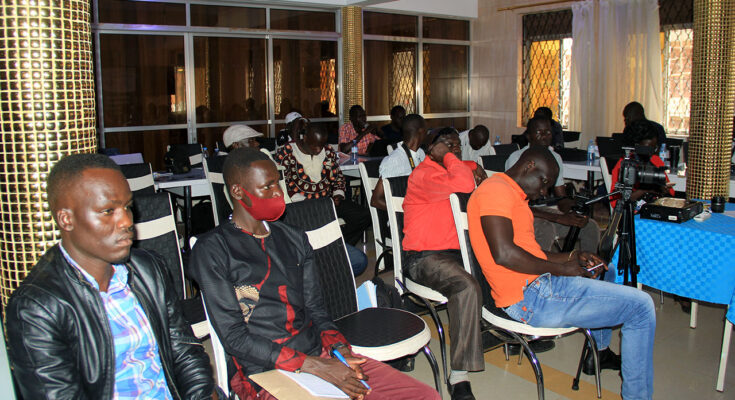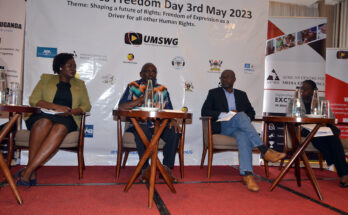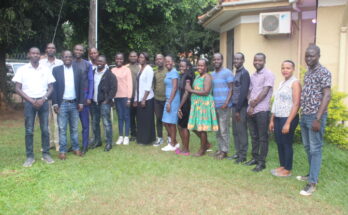PHOTO: Journalists during the commemoration of World Press Freedom Day 2022 in Gulu
Journalists in northern Uganda have been urged to check the ‘digital hygiene’ of their devices regularly in order to avoid losing information to hackers through sophisticated spyware.
Speaking to journalists from Kakanyero Hotel during the World Press Freedom Day 2022 celebration in Gulu, Ruth Atim, a digital activist and co-founder of Gender Tech Initiative Uganda, said that journalists often neglect such security measures, yet in most cases, they have to rely on their devices to do their work. She said the same practice should not be considered only at the individual level but also in the newsrooms.
“Newsrooms should also prioritize ‘digital hygiene’ of their devices such as computers because journalists have to use them to access the internet. If this is not done, they risk losing their content to hackers,” she told journalists.
Ms Atim was speaking at the recent media meeting organized by the Northern Uganda Media Club (NUMEC) in Gulu city to commemorate this year’s Word Press Freedom Day (WPFD) under the theme, ‘Journalists under Digital Siege’. The meeting gathered several stakeholders including journalists, police officers and human rights activists in northern Uganda to discuss the impact of the digital era on the freedom of expression.
Ms Atim also went on to explain ways through which journalists can protect themselves digitally, giving examples such as installing internet firewalls, having strong passwords on devices, activating two-factor authentication on both emails and social media platforms, backing up information both online and offline, installing reputable anti-viruses among others.
Across the globe, journalists are increasingly being targeted by government and non-state actors using surveillance technologies. There are also renewed calls from human rights activists for a temporary moratorium on the sale and transfer of surveillance technology since such forms of underhandedness endanger the free and independent press by exposing one’s privacy, movement, or sources. In Uganda, for instance, reports emerged in November last year that a number of Ugandan investigative journalists were being targeted by Pegasus, a spyware belonging to an Israelite cyber-arms company, NSO Group. Digital platforms such as Facebook also remain banned in Uganda.
Mr Chowoo Willy, the editor at Choice F.M. noted that journalists also need to keep improving their digital skills over time since technology keeps changing. He said such practices would also help them outcompete non-journalists who rely on the internet to convey their information.
NBS journalist, Mr Ben Ongom, who was the moderator at the event, appealed to the NUMEC administration to organise fellowships where junior journalists can be mentored by experienced journalists in a bit to cope with fast-paced digital media.
Mr Oryem, the NUMEC Project Coordinator, revealed that NUMEC has plans to organize capacity-building training to equip journalists with digital security skills, adding that other engagements – between media owners and journalists- will be organised to discuss other pressing issues like improving the payment of journalists.
“NUMEC is also currently organizing an Innovator’s Program’ which will mentor journalists by improving media ideas and also equipping them with digital skills,” he added.




